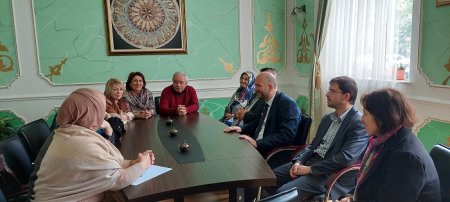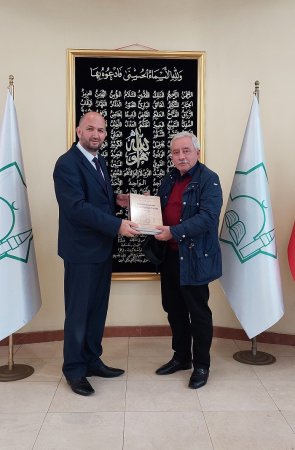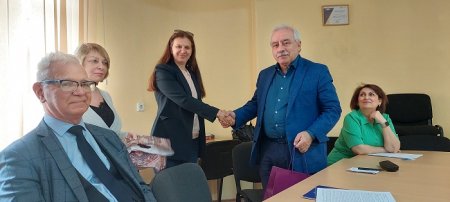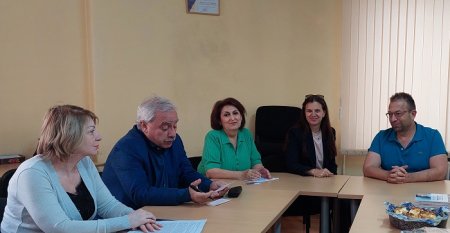The Institute of Philosophy and Sociology of ANAS held a conference and a number of events within the framework of the UNESCO project
 In May of this year, the Institute of Philosophy and Sociology of ANAS with the Institute of Philosophy and Sociology of the Bulgarian Academy of Sciences held a series of events in Sofia (Bulgaria) within the framework of the project “Values and gender equality in family: Azerbaijan, Bulgaria, Turkiye”, the conceptual and methodological basis of which was proposed by the Azerbaijani side. The project was supported by UNESCO and the Azerbaijan National Commission of UNESCO.
In May of this year, the Institute of Philosophy and Sociology of ANAS with the Institute of Philosophy and Sociology of the Bulgarian Academy of Sciences held a series of events in Sofia (Bulgaria) within the framework of the project “Values and gender equality in family: Azerbaijan, Bulgaria, Turkiye”, the conceptual and methodological basis of which was proposed by the Azerbaijani side. The project was supported by UNESCO and the Azerbaijan National Commission of UNESCO.The conference held at the Bulgarian Academy of Sciences on the theme "Consciousness, moral culture and gender equality in family" was opened by Prof. Bogdana Todorova, the deputy director of the Institute. She greeted all the participants and briefly informed them about the purpose and objectives of the conference. Then the floor was given to Prof. Ilham Mammadzada, who began his speech with a message about the announcement in Azerbaijan of the 100th anniversary of the national leader Heydar Aliyev and Zarifa Aliyeva and how these events are celebrated in our country. In his speech “Philosophical epistemology of the problem of family”, Mammadzada emphasized that family as an institution occupies an important place in various societies but as an object of study it is very complex, since in its functioning much depends not only on the laws in force, on the dominant values, on culture and its perception of family values but also on how they are interpreted and understood, researched and communicated to the public. In this issue, the ideology of Azerbaijanism, culture and consciousness play a crucial role. The professor also assigned a special role to the methodology of gender studies, which includes both the analysis of social networks in order to compare the opinions of citizens on the values of equality in family, and the conduct of an expert survey on concepts of interest and the use of this knowledge in the research work of scientists. This methodology necessarily involves the analysis of the relationship of qualia to consciousness as well as the use of AI in research on the culture of family relations.
 Continuing the theme of the methodology of gender studies, Associate Professor Albena Nakova made a presentation "Sociological studies of family problems in different countries." Deputy Director of the Institute of Philosophy and Sociology of BAN Prof. Vasil Kirov emphasized the importance of using a digital platform that helps to solve problems effectively in various subject areas and can be useful for building research competencies in the gender issue as well. D.f. Samira Dadashova in her speech “Gender equality, ethics and the problem of values in family” also noted that the gender issue is not the task of one specific discipline, because it affects absolutely all spheres of life. The vision of gender problems can influence the perception of many social problems on a regional and global scale, because the gender problem has a huge, although mostly unconscious, impact on the nature and development of culture. Changing the system of social roles of women and men, including the traditional concept of family, which is one of the characteristic processes of the 21st century, radically affects society, its institutions, culture and ideology. These phenomena require their understanding, first of all, philosophical one on an interdisciplinary basis and using AI. It should be noted that the interdisciplinary approach and the application of AI are important not only because they are the fashionable trend of science today, but also because the very concept of gender has changed and expanded.
Continuing the theme of the methodology of gender studies, Associate Professor Albena Nakova made a presentation "Sociological studies of family problems in different countries." Deputy Director of the Institute of Philosophy and Sociology of BAN Prof. Vasil Kirov emphasized the importance of using a digital platform that helps to solve problems effectively in various subject areas and can be useful for building research competencies in the gender issue as well. D.f. Samira Dadashova in her speech “Gender equality, ethics and the problem of values in family” also noted that the gender issue is not the task of one specific discipline, because it affects absolutely all spheres of life. The vision of gender problems can influence the perception of many social problems on a regional and global scale, because the gender problem has a huge, although mostly unconscious, impact on the nature and development of culture. Changing the system of social roles of women and men, including the traditional concept of family, which is one of the characteristic processes of the 21st century, radically affects society, its institutions, culture and ideology. These phenomena require their understanding, first of all, philosophical one on an interdisciplinary basis and using AI. It should be noted that the interdisciplinary approach and the application of AI are important not only because they are the fashionable trend of science today, but also because the very concept of gender has changed and expanded.Associate Professor Sevinj Hasanova in her speech “Ethical analysis of family and gender inequality” put forward the thesis about the need for a new paradigm of thinking and approach to the reality of family in society, which actualizes the orientation of science itself towards building a modern ethical theory of family and gender. Considering the changes in methodological and research approaches to the problem of the biology of gender and family in society, it is concluded that these changes encourage rethinking of ethical aspects and a shift to the ethics of discourse, the basis of which is a consensus that maintains a balance between the values of equality and national culture.
 Prof. Bogdana Todorova in her report “Family, traditions and values in Modern Bulgaria” noted that almost all the achievements of mankind in the process of historical development are reflected in the family, which, in turn, is a kind of custodian of traditions, moral norms and principles transmitted from generation to generation. The high influence of the religious factor on the formation of marriage and family relations in Turkish families in Bulgaria was noted. Associate Professor Zohra Aliyeva delivered a report titled "Azerbaijan's state strategy for gender equality", where special attention was paid to the policy of improving the quality of education in the country.
Prof. Bogdana Todorova in her report “Family, traditions and values in Modern Bulgaria” noted that almost all the achievements of mankind in the process of historical development are reflected in the family, which, in turn, is a kind of custodian of traditions, moral norms and principles transmitted from generation to generation. The high influence of the religious factor on the formation of marriage and family relations in Turkish families in Bulgaria was noted. Associate Professor Zohra Aliyeva delivered a report titled "Azerbaijan's state strategy for gender equality", where special attention was paid to the policy of improving the quality of education in the country.The conference participants also discussed the content of the book, based on research within the project. The conference was ended by Prof. Veselin Petrov, emphasizing the relevance of this project and the importance of further cooperation between Institutions. In general, the speeches of the participants were focused on the interests of family, regardless of its type (rural or urban, religious or secular) and covered many cultural and ethical issues, from the analysis of gender research methodology to the source of domestic violence and the search for ways to prevent it.
 The main objective of the conference was, first of all, to discuss the concept of family in social tradition and philosophy in order to strengthen the protection of family as an institution, as well as to compare and in-depth study of the values and various family models in Azerbaijan, Bulgaria and Turkiye, in the presence of different religious traditions, beliefs and distinct cultures in these countries. For this purpose, the project participants visited the mosque in Sofia, where they had a meeting with the Chief Mufti, as well as with the staff of the Islamic University in Sofia (Prof. Salima Hasanova, Ph.D. Ahmed Hasanov, Ph.D. Amina Bayraktarova, Ph.D. Kadir Mohammed and others).
The main objective of the conference was, first of all, to discuss the concept of family in social tradition and philosophy in order to strengthen the protection of family as an institution, as well as to compare and in-depth study of the values and various family models in Azerbaijan, Bulgaria and Turkiye, in the presence of different religious traditions, beliefs and distinct cultures in these countries. For this purpose, the project participants visited the mosque in Sofia, where they had a meeting with the Chief Mufti, as well as with the staff of the Islamic University in Sofia (Prof. Salima Hasanova, Ph.D. Ahmed Hasanov, Ph.D. Amina Bayraktarova, Ph.D. Kadir Mohammed and others).It should also be noted that the inhabitants of Bulgaria spoke with great respect and admiration for Azerbaijan and President Ilham Aliyev, noting the effectiveness of cooperation between our countries in the economic and cultural spheres.



